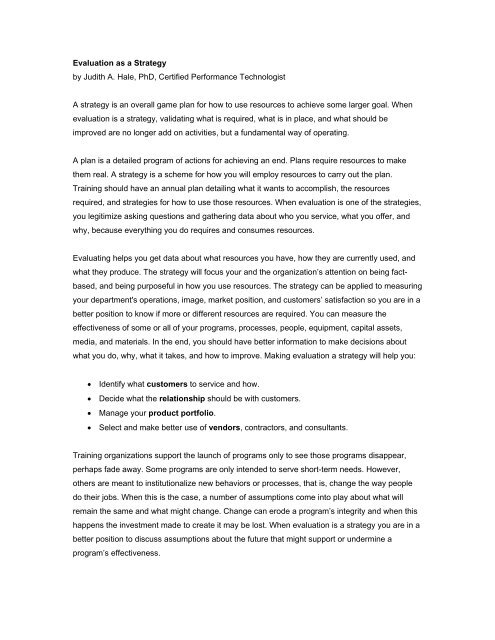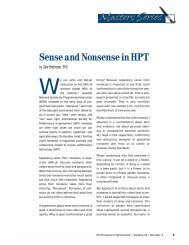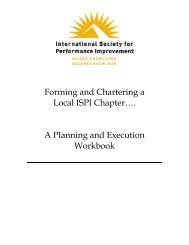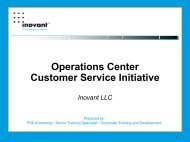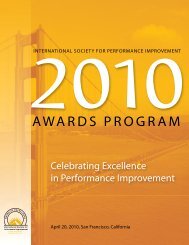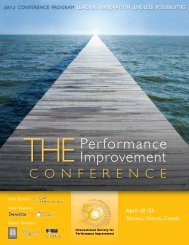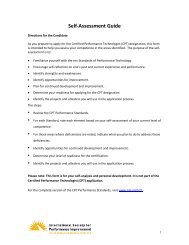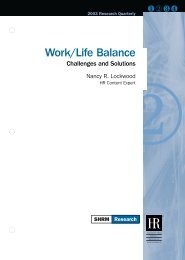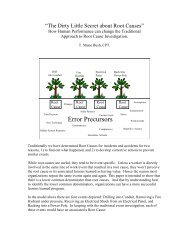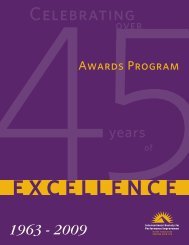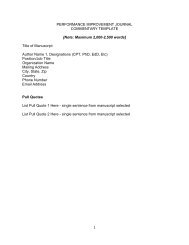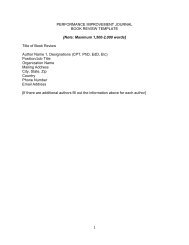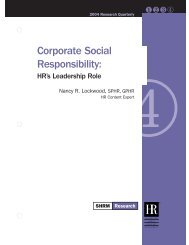Evaluation as a Strategy by Judith A. Hale, PhD, Certified ...
Evaluation as a Strategy by Judith A. Hale, PhD, Certified ...
Evaluation as a Strategy by Judith A. Hale, PhD, Certified ...
You also want an ePaper? Increase the reach of your titles
YUMPU automatically turns print PDFs into web optimized ePapers that Google loves.
<strong>Evaluation</strong> <strong>as</strong> a <strong>Strategy</strong><br />
<strong>by</strong> <strong>Judith</strong> A. <strong>Hale</strong>, <strong>PhD</strong>, <strong>Certified</strong> Performance Technologist<br />
A strategy is an overall game plan for how to use resources to achieve some larger goal. When<br />
evaluation is a strategy, validating what is required, what is in place, and what should be<br />
improved are no longer add on activities, but a fundamental way of operating.<br />
A plan is a detailed program of actions for achieving an end. Plans require resources to make<br />
them real. A strategy is a scheme for how you will employ resources to carry out the plan.<br />
Training should have an annual plan detailing what it wants to accomplish, the resources<br />
required, and strategies for how to use those resources. When evaluation is one of the strategies,<br />
you legitimize <strong>as</strong>king questions and gathering data about who you service, what you offer, and<br />
why, because everything you do requires and consumes resources.<br />
Evaluating helps you get data about what resources you have, how they are currently used, and<br />
what they produce. The strategy will focus your and the organization’s attention on being factb<strong>as</strong>ed,<br />
and being purposeful in how you use resources. The strategy can be applied to me<strong>as</strong>uring<br />
your department's operations, image, market position, and customers’ satisfaction so you are in a<br />
better position to know if more or different resources are required. You can me<strong>as</strong>ure the<br />
effectiveness of some or all of your programs, processes, people, equipment, capital <strong>as</strong>sets,<br />
media, and materials. In the end, you should have better information to make decisions about<br />
what you do, why, what it takes, and how to improve. Making evaluation a strategy will help you:<br />
• Identify what customers to service and how.<br />
• Decide what the relationship should be with customers.<br />
• Manage your product portfolio.<br />
• Select and make better use of vendors, contractors, and consultants.<br />
Training organizations support the launch of programs only to see those programs disappear,<br />
perhaps fade away. Some programs are only intended to serve short-term needs. However,<br />
others are meant to institutionalize new behaviors or processes, that is, change the way people<br />
do their jobs. When this is the c<strong>as</strong>e, a number of <strong>as</strong>sumptions come into play about what will<br />
remain the same and what might change. Change can erode a program’s integrity and when this<br />
happens the investment made to create it may be lost. When evaluation is a strategy you are in a<br />
better position to discuss <strong>as</strong>sumptions about the future that might support or undermine a<br />
program’s effectiveness.
There is an old adage that says, “What you me<strong>as</strong>ure is what you get.” This holds true for training<br />
<strong>as</strong> well. When evaluation becomes a strategy, not just a <strong>by</strong>-product of how the function gets<br />
funded, then me<strong>as</strong>urement results in data that leads to better business decisions. When<br />
evaluation is a strategy, it forces you to validate that what you do and how you do it actually adds<br />
value. It changes the nature of the conversation you have with colleagues, clients, and<br />
contractors.<br />
Note: Excerpted from Performance-B<strong>as</strong>ed <strong>Evaluation</strong>: Tools and Techniques to Me<strong>as</strong>ure<br />
Training’s Effectiveness, (2002) Jossey-B<strong>as</strong>s, <strong>by</strong> <strong>Judith</strong> <strong>Hale</strong>, with permission of the author.<br />
<strong>Judith</strong> <strong>Hale</strong>, <strong>PhD</strong>, CPT is the author of nine books on evaluation and performance improvement<br />
consulting. She h<strong>as</strong> been a consultant to management in the public and private sectors for over<br />
25 years. She specializes in needs <strong>as</strong>sessments, certification programs, evaluation protocols,<br />
and the implementation of major interventions. She is a p<strong>as</strong>t president of ISPI and the current<br />
director of ISPI's certification the CPT. <strong>Judith</strong> w<strong>as</strong> awarded a BA from Ohio State University, a<br />
MA from Miami University, and a <strong>PhD</strong> from Purdue University.


